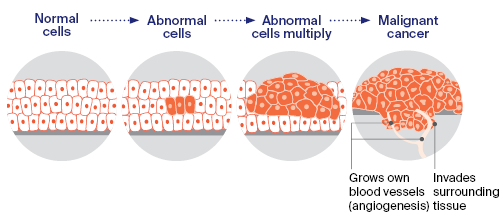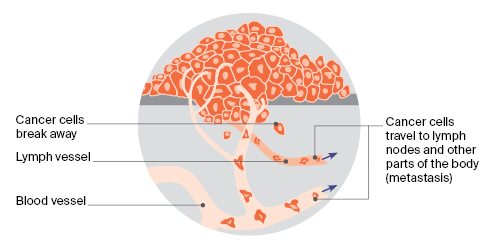- Home
- About Cancer
- Understanding cancer
- What is cancer?
What is cancer?
Cancer is a disease of the cells. Cells are the body’s basic building blocks – they make up tissues and organs. The body constantly makes new cells to help us grow, replace worn-out tissue and heal injuries.
How cancer starts
| How do cells normally function? | Normally, cells multiply and die in an orderly way, ensuring that each new cell replaces one that is lost. |
| What happens when cells become abnormal? | Sometimes, however, cells become abnormal and keep growing. |
| Solid cancers and tumours | In solid cancers, such as breast cancer, the abnormal cells form a mass or lump called a tumour. |
| Cancers without tumours | In some cancers, such as leukaemia, the abnormal cells build up in the blood instead of forming a tumour. |
| Are all tumours cancerous? | Not all tumours are cancer. Benign tumours tend to grow slowly and usually don’t spread to other parts of the body or turn into cancer. |
| What are malignant tumours? | Cancerous tumours, also known as malignant tumours, have the potential to spread. They may invade nearby tissue, destroying normal cells. Cancer cells can also break away and travel through the bloodstream or lymph vessels to other parts of the body. |
| What is primary cancer? | The cancer that first develops is called the primary cancer. If it has not spread to other parts of the body, it is considered localised cancer. |

How cancer spreads
If the primary cancer cells grow and form another tumour at a new site, it is called a secondary cancer or metastasis. A metastasis keeps the name of the original cancer. For example, pancreatic cancer that has spread to the liver is called metastatic pancreatic cancer, even though the main symptoms may be coming from the liver.

→ READ MORE: How common is cancer?
Need to talk?
Call 13 11 20 to talk to a health professional Or email us your questions.